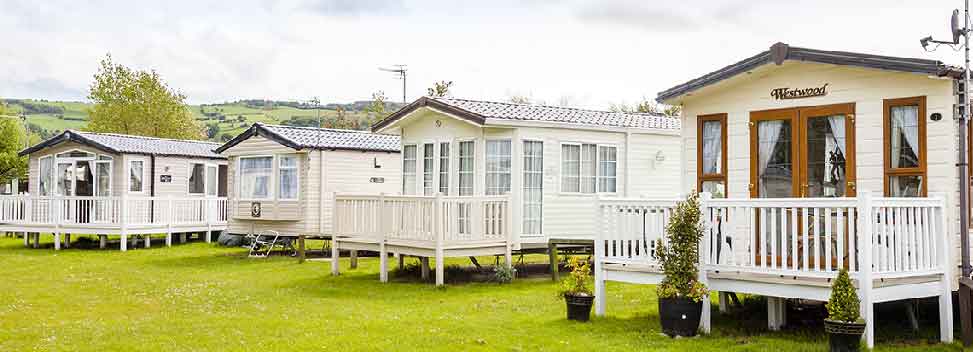Can you live in a static caravan permanently
Written by Nick Grant
|
Published on 30th August 2022
|
Last Updated on 23rd February 2024
|
Read time: 5 minutes

Thinking of trading in your traditional brick-and-mortar property for a static caravan? Whether it’s the idyllic scenery, lower running costs, or less maintenance that’s tempting you, it can be an attractive living option. But before you put up that for sale sign, have you thought about whether you can legally live in a static caravan? Purchasing a mobile property isn’t like buying a house, so let’s take a closer look at the legalities and what you need to know.
Can you live in a static caravan all year round?
Ultimately, it depends on where you live; not which area of the UK you choose, but whether you opt for a residential park or a holiday park.
In the UK, the Mobile Homes Act 1983[1] regulates that you can only live in a static caravan all year if it’s situated in a park with a permanent residential licence.
Can you live in a static caravan on private land?
You might want to buy private land and place a static caravan there. If so, you’ll need to talk to the council first, since different local authorities have different rules. You must also seek planning permission from your local council[2].
If, however, you plan on putting a static caravan on land at your existing property, the rules are slightly different. The Caravan Sites and Control of Development Act 1980 states you can place a static caravan or mobile home in your garden or on the drive without planning permission[3]. The caveat is that you can only do this temporarily; for example, while your house is being renovated. Therefore, it cannot be used as a permanent home.
Can you live in a static caravan on a caravan park?
It depends on whether you choose a residential park or a holiday park. As we’ve mentioned, the Mobile Homes Act 19831 allows you to live in a static caravan full time if it’s somewhere with a permanent residential licence. A residential park gives you permanent residency, so you can live there all year round.
On the other hand, holiday parks are just that—for holidays. Usually, there’s a time limit on how long you can spend at a holiday park and for which months of the year. Some holiday parks may even shut down over the winter.
How long can I stay in my static caravan on a holiday park?
Since you don’t have a permanent licence at a holiday park, you can’t live there all year. Therefore, you must have another residence to use as your main, permanent address4.
In addition, holiday parks have rules surrounding how long you can stay in your static caravan. This could include the number of consecutive days you can stay, or which months of the year you visit. Remember, many holiday parks are closed during the winter months.
Any terms are governed by the council, so they may differ depending on where your static caravan resides. So, be sure to read through your agreement and contract before signing.
What are the advantages of living in a static caravan permanently?
Static caravans are hugely popular, and it’s easy to see why. They allow you to downsize into something cosier and easier to maintain, often within a tight-knit community. Owners may also make savings because static caravans can generally be much cheaper to buy than houses and cost a lot less to run.
In addition, some static caravans come with added security. Usually, they’re monitored by 24/7 surveillance, secured with gated access to prevent intruders. This can also help to make a caravan cheaper to insure than typical properties because high security measures are in place to protect your home and valuables.
Remember, before any home move, it’s important to weigh up the pros and cons. Although static caravans may help you save money, they also come with additional costs, such as pitch fees and additional insurance.
Although static caravan insurance isn’t a legal requirement, that doesn’t mean you shouldn’t consider it. Living in a static caravan can come with additional risks, such as natural disasters, theft, and damage while it’s left unoccupied. So, you might feel it’s a good idea to get cover to help protect it against such risks, should anything go wrong.
Speak to an Intasure representative, and we’ll help you get cover to meet your needs. Our flexible policies can include protection against theft, damage, natural disasters, alternative accommodation, and even public liability claims.
Get a quote online for your static home today or contact our UK team on 0345 111 0680 for more information.
Sources:
1 https://www.legislation.gov.uk/ukpga/1983/34/contents
2 https://www.legislation.gov.uk/ukpga/Eliz2/8-9/62
3 https://www.legislation.gov.uk/ukpga/Eliz2/8-9/62/schedule/FIRST
4 https://www.parksureinsurance.co.uk/can-live-holiday-home/
*The sole purpose of this article is to provide guidance on the issues covered. This article is not intended to give legal advice, and, accordingly, it should not be relied upon. It should not be regarded as a comprehensive statement of the law and/or market practice in this area. We make no claims as to the completeness or accuracy of the information contained herein or in the links which were live at the date of publication. You should not act upon (or should refrain from acting upon) information in this publication without first seeking specific legal and/or specialist advice. Arthur J. Gallagher Insurance Brokers Limited trading as Intasure accepts no liability for any inaccuracy, omission or mistake in this publication, nor will we be responsible for any loss which may be suffered as a result of any person relying on the information contained herein.

Nick Grant is a Business Development Manager at Intasure with 10 years of insurance experience.

